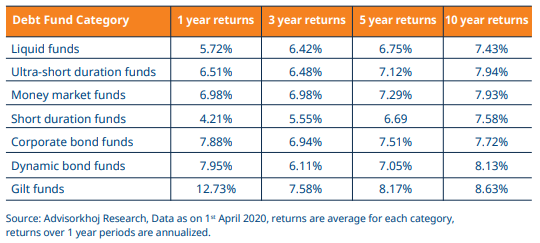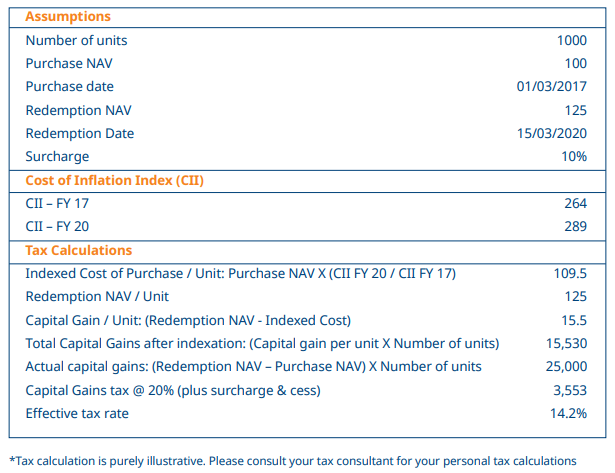Debt funds can give higher returns
Debt funds are fixed income mutual fund schemes which invest in debt and money market instruments like CPs, CDs, Corporate Bond, T-Bills, G-Secs etc. These instruments pay interest (coupon) at pre defined intervals and the face value (principal)
upon maturity. The yields of many of these instruments are usually higher than bank FD interest rates of similar maturities. Yields of AAA rated corporate bonds can be 150 – 200 bps higher than FD interest rates. In addition to higher
yields, since these instruments are traded in the market, you can benefit from price appreciation. The chart below shows the trailing returns of different debt fund categories over different tenures.
Based on historical data, you can see that across different product categories (risk profiles) and investment tenures, debt funds have the potential to give better returns than bank FDs.
Past performance may or may sustain in future. The returns shown above are returns of the category and do not in any way depict the performance of any individual scheme of any Fund.
Debt funds are tax efficient
Bank FD interest is taxed as per the income tax rate of the investor. Capital gains in debt funds held for over three years are taxed at 20% after allowing for indexation benefits. Indexation benefits can reduce tax obligations substantially
for investors in higher tax brackets. Incidence of taxation in fixed income funds arise only if you redeem (sell) your mutual fund units or if you receive dividends. Capital gains on your redemption proceeds and dividends are taxed differently.
Capital Gains Tax
There are two kinds of capital gains in fixed income funds:-
- Short term capital gains: If units of fixed income funds are sold within 36 months from the date of purchase then capital gains arising out sale of units will be treated as short term capital gains for tax purposes. Short term
capital gains are added to your income and taxed according to your income tax slab rate.
- Long term capital gains: If units of fixed income funds are sold after 36 months from the date of purchase then capital gains arising out of sale of units will be treated as long term capital gains for tax purposes. Long term
capital gains are taxed at 20% after allowing for indexation benefits.
Illustration of Long Term Capital Gains-
If you received the same maturity amount from a bank FD, then your tax outdo would have been Rs 8,280 if you were in the 30% tax bracket (plus surcharge & cess). The long term capital gains tax in the example above is nearly 60% less.
Dividend Tax
Prior to this financial year, mutual fund dividends were tax free in the hands of the investors but the scheme (AMC) had to pay dividend distribution tax (DDT) at the rate of 29.12% for debt funds before paying dividends to investors.
In this Union Budget, the Government has abolished DDT. Dividends will now be added to your income and taxed as per your income tax slab. If you are in the 30% tax bracket, your post tax dividend will now be lower (assuming same
dividend payout rate per unit), but if you are in the lower tax brackets your post tax dividends will be higher. You should decide whether to invest in growth or dividend re-investment option depending on your individual tax situations.
Disclaimer:
An Investor Education and Awareness Initiative by Mirae Asset Mutual Fund. All Mutual Fund investors have to go through a one-time KYC (Know Your Customer) including the process for change in address, Phone number, bank details, etc. Investors should deal only with registered Mutual Funds details of which can be verified on SEBI website (https://www.sebi.gov.in) under ‘Intermediaries /Market Infrastructure Institutions’. For further information on KYC, RMFs and procedure to lodge a complaint in case of any grievance, you may refer the Knowledge Centre section available on the website of Mirae Asset Mutual Fund. Investors may lodge complaints on https://www.scores.gov.in against registered intermediaries if they are unsatisfied with the responses. SCORES facilitate you to lodge your complaint online with SEBI and subsequently view its status.
Mutual Fund investments are subject to market risks, read all scheme related documents carefully.
 ETF Website
ETF Website
 Invest Now
Invest Now
 Online e-KYC
Online e-KYC

![mirae asset usa]() Australia
Australia
![mirae asset brazil]() Brazil
Brazil
![mirae asset colombia]() Colombia
Colombia
![mirae asset hong kong]() Hong Kong SAR
Hong Kong SAR
![mirae asset Japan]() Japan
Japan
![mirae asset uk]() United Kingdom
United Kingdom
![mirae asset usa]() United States
United States
![mirae asset singapore]() Singapore
Singapore
![mirae asset uk]() Ireland
Ireland
![mirae asset canada]() Canada
Canada
![mirae asset india]() Global
Global
![mirae asset australia]() Australia
Australia
![mirae asset hong kong]() Hong Kong SAR
Hong Kong SAR
![mirae asset india]() India
India
![mirae asset korea]() Korea
Korea
![mirae asset korea]() UAE
UAE
![mirae asset uk]() United Kingdom
United Kingdom
![mirae asset usa]() United States
United States
![mirae asset vietnam]() Vietnam
Vietnam
![mirae asset korea]() Korea
Korea
 Global
Global
 Australia
Australia
 Hong Kong SAR
Hong Kong SAR
 India
India
 Korea
Korea
 UAE
UAE
 United Kingdom
United Kingdom
 United States
United States
 Vietnam
Vietnam
 Korea
Korea
 Australia
Australia
 Brazil
Brazil
 Colombia
Colombia
 Hong Kong SAR
Hong Kong SAR
 Japan
Japan
 United Kingdom
United Kingdom
 United States
United States
 Singapore
Singapore
 Ireland
Ireland
 Canada
Canada






